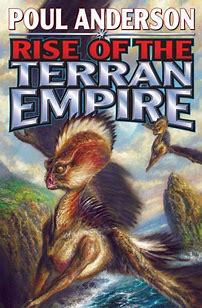In Mirkheim, David and Coya Falkayn already have a young daughter, Juanita. Then their son, Nicholas, named after his great-grandfather, Nicholas van Rijn, is born near the end of the novel.
In "Wingless," Nicholas Falkayn has a son, Nathaniel/"Nat," on Avalon.
In The People Of The Wind, their descendant, Tabitha Falkayn, tells Philippe Rochefort, that David Falkayn's granddaughter had named Avalon when he had decided to colonize that planet.
We deduce that that granddaughter, unnamed in the text, was Juanita's daughter. We want to know more. Mirkheim does show us David's mother and brothers on Hermes. There is some information there that we can dig out.
"Lodestar," in Volume II, David Falkayn: Star Trader, imparts some information about the generation between van Rijn and his granddaughter, Coya. Mirkheim also features van Rijn's son on Hermes.
Future history is also future biography and genealogy.

7 comments:
Kaor, Paul!
Strictly, Nicholas Falkayn was Old Nick's great grandson.
And it's just as possible that the granddaughter of David Falkayn who gave Grey its permanent name was a daughter of Nicholas Falkayn. We simply don't know for sure, either way.
Ad astra! Sean
Sean,
Avalon was named before it was colonized, thus before Nicholas Falkayn's first son, Nat, was born on Avalon.
Paul.
Kaor, Paul!
But was Nathaniel the first, eldest child of Nicholas Falkayn? If not then Nat possibly had an older sister.
Ad astra! Sean
As the saying goes, a human being is a mechanism for giving descendants to ancestors...
Or something like that.
Kaor, Mr. Stirling!
Both men and women have different, but necessary roles in reproduction. I know that sounds like a tritely obvious truism.
Ad astra! Sean
Sean: well, a basic difference is in the number of potential offspring.
A male can have -thousands- of children, and some have had. There are Y-dna bottlenecks in every population studied.
A woman can have no more than about a dozen, give or take, and usually less. The biological maximum is an average of about eight.
Thus a female has more of a genetic investment in each one.
Post a Comment